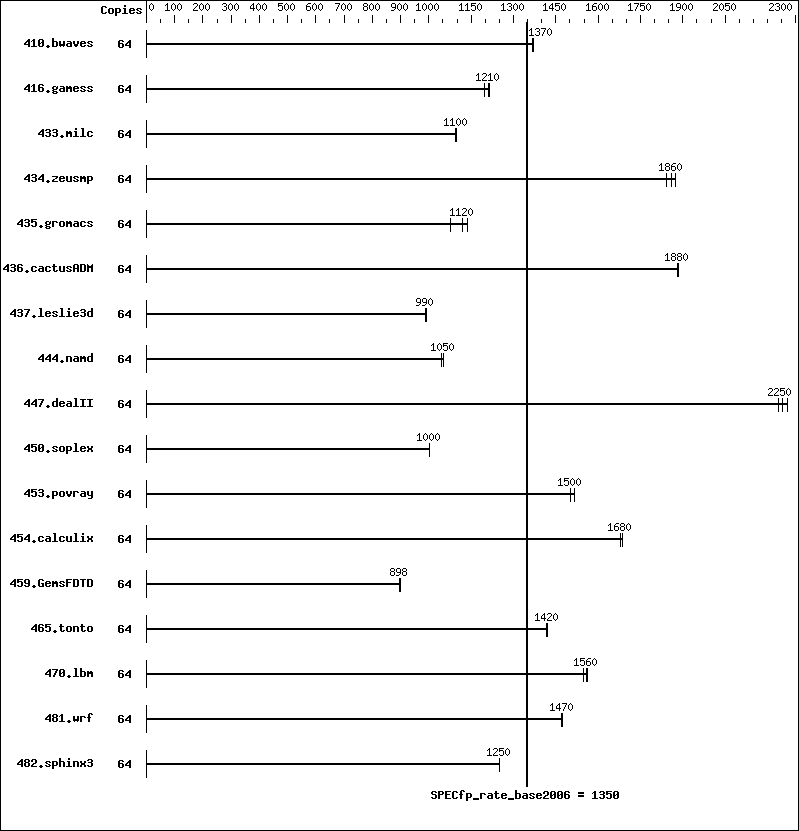| CPU2006 license: | 3 | Test date: | Nov-2017 |
|---|---|---|---|
| Test sponsor: | HPE | Hardware Availability: | Nov-2017 |
| Tested by: | HPE | Software Availability: | Sep-2017 |

| Hardware | |
|---|---|
| CPU Name: | AMD EPYC 7351 |
| CPU Characteristics: | AMD Turbo CORE technology up to 2.90 GHz |
| CPU MHz: | 2400 |
| FPU: | Integrated |
| CPU(s) enabled: | 32 cores, 2 chips, 16 cores/chip, 2 threads/core |
| CPU(s) orderable: | 1, 2 chip(s) |
| Primary Cache: | 64 KB I + 32 KB D on chip per core |
| Secondary Cache: | 512 KB I+D on chip per core |
| L3 Cache: | 64 MB I+D on chip per chip, 8 MB shared / 2 cores |
| Other Cache: | None |
| Memory: | 1 TB (16 x 64 GB 4Rx4 PC4-2666V-L) |
| Disk Subsystem: | 1 x 400 GB SAS SSD, RAID 0 |
| Other Hardware: | None |
| Software | |
|---|---|
| Operating System: | SUSE Linux Enterprise Server 12 (x86_64) SP3 Kernel 4.4.73-5-default |
| Compiler: | C/C++/Fortran: Version 4.5.2.1 of x86 Open64 Compiler Suite (from AMD) |
| Auto Parallel: | No |
| File System: | xfs |
| System State: | Run level 3 (multi-user) |
| Base Pointers: | 64-bit |
| Peak Pointers: | Not Applicable |
| Other Software: | None |
Results Table
| Benchmark | Base | Peak | ||||||||||||
|---|---|---|---|---|---|---|---|---|---|---|---|---|---|---|
| Copies | Seconds | Ratio | Seconds | Ratio | Seconds | Ratio | Copies | Seconds | Ratio | Seconds | Ratio | Seconds | Ratio | |
| Results appear in the order in which they were run. Bold underlined text indicates a median measurement. | ||||||||||||||
| 410.bwaves | 64 | 634 | 1370 | 635 | 1370 | 636 | 1370 | |||||||
| 416.gamess | 64 | 1045 | 1200 | 1035 | 1210 | 1032 | 1210 | |||||||
| 433.milc | 64 | 535 | 1100 | 535 | 1100 | 536 | 1100 | |||||||
| 434.zeusmp | 64 | 313 | 1860 | 316 | 1840 | 311 | 1870 | |||||||
| 435.gromacs | 64 | 425 | 1080 | 408 | 1120 | 402 | 1140 | |||||||
| 436.cactusADM | 64 | 406 | 1880 | 407 | 1880 | 407 | 1880 | |||||||
| 437.leslie3d | 64 | 607 | 991 | 609 | 988 | 608 | 990 | |||||||
| 444.namd | 64 | 487 | 1050 | 487 | 1050 | 491 | 1050 | |||||||
| 447.dealII | 64 | 327 | 2240 | 325 | 2250 | 323 | 2270 | |||||||
| 450.soplex | 64 | 532 | 1000 | 532 | 1000 | 532 | 1000 | |||||||
| 453.povray | 64 | 226 | 1500 | 225 | 1520 | 227 | 1500 | |||||||
| 454.calculix | 64 | 314 | 1680 | 314 | 1680 | 313 | 1690 | |||||||
| 459.GemsFDTD | 64 | 754 | 901 | 759 | 895 | 756 | 898 | |||||||
| 465.tonto | 64 | 444 | 1420 | 443 | 1420 | 445 | 1420 | |||||||
| 470.lbm | 64 | 564 | 1560 | 568 | 1550 | 562 | 1560 | |||||||
| 481.wrf | 64 | 486 | 1470 | 486 | 1470 | 486 | 1470 | |||||||
| 482.sphinx3 | 64 | 999 | 1250 | 996 | 1250 | 998 | 1250 | |||||||
Submit Notes
The config file option 'submit' was used. 'numactl' was used to bind copies to the cores. See the configuration file for details.
Operating System Notes
Set vm/nr_hugepages=86016 in /etc/sysctl.conf mount -t hugetlbfs nodev /mnt/hugepages
Platform Notes
BIOS Configuration: Thermal Configuration set to Maximum Cooling Performance Determinism set to Power Deterministic Memory Patrol Scrubbing set to Disabled Workload Profile set to General Throughput Compute Minimum Processor Idle Power Core C-State set to C6 State Processor Power and Utilization Monitoring set to Disabled
General Notes
Environment variables set by runspec before the start of the run: HUGETLB_LIMIT = "896" LD_LIBRARY_PATH = "/home/cpu2006/amd1603-rate-libs-revB/32:/home/cpu2006/amd1603-rate-libs-revB/64" The binaries were built with the x86 Open64 Compiler Suite, which is only available from (and supported by) AMD at http://developer.amd.com/tools-and-sdks/cpu-development/x86-open64-compiler-suite/
Base Compiler Invocation
C benchmarks:
| opencc |
C++ benchmarks:
| openCC |
Fortran benchmarks:
| openf95 |
Benchmarks using both Fortran and C:
| opencc openf95 |
Base Portability Flags
| 410.bwaves: | -DSPEC_CPU_LP64 |
| 416.gamess: | -DSPEC_CPU_LP64 |
| 433.milc: | -DSPEC_CPU_LP64 |
| 434.zeusmp: | -DSPEC_CPU_LP64 |
| 435.gromacs: | -DSPEC_CPU_LP64 |
| 436.cactusADM: | -DSPEC_CPU_LP64 -fno-second-underscore |
| 437.leslie3d: | -DSPEC_CPU_LP64 |
| 444.namd: | -DSPEC_CPU_LP64 |
| 447.dealII: | -DSPEC_CPU_LP64 |
| 450.soplex: | -DSPEC_CPU_LP64 |
| 453.povray: | -DSPEC_CPU_LP64 |
| 454.calculix: | -DSPEC_CPU_LP64 |
| 459.GemsFDTD: | -DSPEC_CPU_LP64 |
| 465.tonto: | -DSPEC_CPU_LP64 |
| 470.lbm: | -DSPEC_CPU_LP64 |
| 481.wrf: | -DSPEC_CPU_LINUX -DSPEC_CPU_CASE_FLAG -DSPEC_CPU_LP64 -fno-second-underscore |
| 482.sphinx3: | -DSPEC_CPU_LP64 |
Base Optimization Flags
C benchmarks:
| -Ofast -OPT:malloc_alg=1 -HP:bd=2m:heap=2m -IPA:plimit=8000 -IPA:small_pu=100 -mso -march=bdver1 -mno-fma4 -mno-xop -mno-tbm -WB, -Wl, -z,muldefs |
C++ benchmarks:
| -Ofast -static -CG:load_exe=0 -OPT:malloc_alg=1 -INLINE:aggressive=on -HP:bd=2m:heap=2m -D__OPEN64_FAST_SET -march=bdver2 -mno-fma4 -mno-xop -mno-tbm -WB, -Wl, -z,muldefs |
Fortran benchmarks:
| -Ofast -LNO:blocking=off -LNO:simd_peel_align=on -OPT:rsqrt=2 -OPT:unroll_size=256 -HP:bd=2m:heap=2m -mso -march=bdver1 -mno-fma4 -mno-xop -mno-tbm -WB, -Wl, -z,muldefs |
